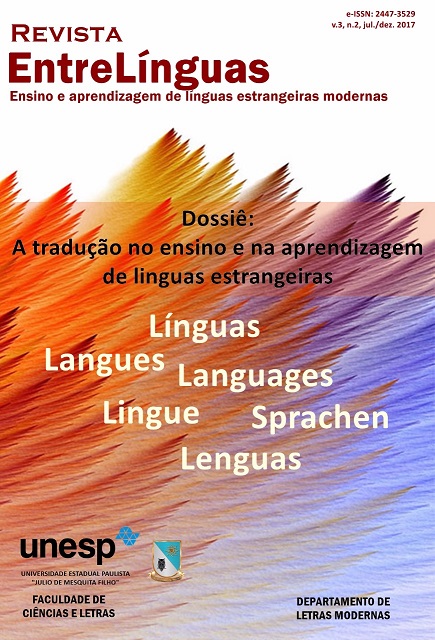Data-driven learning, translation and executive secretariat: a self study approach proposal for english learners
DOI:
https://doi.org/10.29051/rel.v3.n2.2017.9316Keywords:
Foreign language teaching and learning. Data-driven learning. Translation. Executive secretariat.Abstract
The foreign language teaching context in Executive Secretariat has specific characteristics which differ from the general teaching of foreign languages for its specific purposes, since the language is used for professional purposes, or international business communication. Considering this context, the aim of our study is to present a teaching proposal with the use of DDL (Data-Driven Learning) in exercises aimed at reading comprehension and translation production of texts for the executive secretariat students in a self study approach. First, we will work on the reading comprehension of the students with support that can help in the construction of this ability. After that and as a forward step of the reading comprehension activity, we propose a writing and translation production activity with guidelines for autonomous development on the part of the students, with the use of data that direct the learning in the foreign language using data-driven learning (DDL). This proposal complements teaching in the classroom since students who use data-driven learning can act as a language researcher looking forward to analyzing language with a specific focus on its structure and context. The proposed activities also provide preparation for professional translation activities, which will be required of executive secretaries when at their workplaces.Downloads
References
ALBIR, Amparo Hurtado. La competencia traductora y su adquisición. Un modelo holístico y dinámico. Perspectives: Studies in Translatology, v. 7, n. 2, p. 177-188, 1999.
MALMKJÆR, Kirsten. Introduction: Translation and Language Teaching. In: MALMKJÆR, Kirsten (Ed.). Translation & language teaching: Language teaching & translation. Saint Jerome Publications, p. 1-11. 1998.
SARDINHA, Tony Beber. Como usar a Linguística de Corpus no Ensino de Língua Estrangeira–por uma Linguística de Corpus Educacional brasileira. In: TAGNIN, Stella; VIANA, Vander. Corpora no ensino de línguas estrangeiras. São Paulo: HUB Editorial, p. 293-348, 2010.
SARDINHA, Tony Berber. Liguística de corpus e linguística aplicada: o ensino de língua estrangeira. Linguística de corpus. São Paulo: Manole, 2004.
TRIBBLE, Christopher. Small corpora and teaching writing. In: GHADESSY, Mohsen; HENRY, Alex; ROSEBERRY, Robert L. (Ed.). Small corpus studies and ELT: theory and practice, John Benjamins, Amsterdam, p. 381-408, 2001.
McENERY, Tony; XIAO, Richard. What corpora can offer in language teaching and learning? Handbook of Research in Second Language Teaching and Learning. Hinkel, E. (ed.). London & New York: Routledge, 2010, V. 2, p. 364-380.
Downloads
Published
How to Cite
Issue
Section
License
Os manuscritos aceitos e publicados são de propriedade da Revista EntreLínguas. Os artigos publicados e as referências citadas na Revista EntreLínguas são de inteira responsabilidade de seus autores.
Transferência de direitos autorais – autorização para publicação
Caso o artigo submetido seja aprovado para publicação, já fica acordado que o(s) autor(es) autoriza(m) a UNESP a reproduzi-lo e publicá-lo na EntreLínguas, entendendo-se os termos “reprodução” e “publicação” conforme definição respectivamente dos incisos VI e I do artigo 5° da Lei 9610/98. O artigo poderá ser acessado pela rede mundial de computadores (Internet), sendo permitidas, a título gratuito, a consulta e a reprodução de exemplar do artigo para uso próprio de quem a consulta, desde que haja a citação ao texto consultado. Essa autorização de publicação 328 EntreLínguas, Araraquara, v. 1, n .2, p. 323-328, jul./dez. 2015 não tem limitação de tempo, ficando a UNESP responsável pela manutenção da identificação do(s) autor(es) do artigo. Os artigos publicados e as referências citadas na Revista EntreLínguas são de inteira responsabilidade de seus autores.











